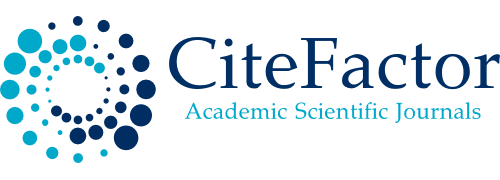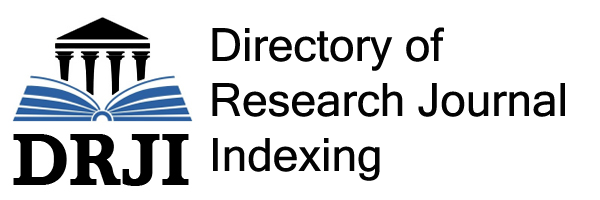Indexing & Abstracting







Publication Ethics and Publication Malpractice Statement
The IJPPR's Publication Ethics and Malpractice statement is based in large part on the Committee on Publication Ethics' rules and standards (COPE). The following are the responsibilities and expectations of authors, reviewers, and editors of the journal.
Duties of Editors
Fair play and editorial independence
Without regard to the authors' race, gender, sexual orientation, ethnic origin, citizenship, religious belief, political philosophy, or institutional affiliation, editors evaluate submitted manuscripts solely on the basis of their academic merit (importance, originality, study's validity, clarity) and relevance to the journal's scope. Government policies or the policies of anyotheragencyoutsideofthemagazinehavenobearingonthedecisionstoeditandpublish. TheEditor-in-Chiefhascompletecontroloverthejournal'seditorialcontentaswellasthedate of itsrelease.
Confidentiality
Other than the corresponding author, reviewers, possible reviewers, other editorial advisers, andthepublisher,whereappropriate,editorsandeditorialstaffwillnotdivulgeanyinformation about a submittedarticle.
Disclosure and conflicts of interest
Without the authors' clear written authorization, editors and editorial board members will not use unpublished information revealed in a submitted paper for their own study. Editors will keepanyprivilegedinformationorideastheygetasaconsequenceofhandlingthemanuscript secret and will not exploit them for personal gain. Editors shall refrain from examining manuscripts in which they have competing, collaborating, or other relationships/connections with any of the authors, corporations, or institutions associated with the articles; instead, they will delegate the article to another member of the editorialboard.
Publication decisions
The editors make sure that all submissions that are being considered for publication are peer- reviewedbyatleasttwoexpertsinthesubject.TheEditor-in-Chiefisinchargeofdetermining which of the papers submitted to the journal will be published, depending on the work's validity, value to researchers and readers, reviewers' comments, and any current legal requirements including libel, copyright infringement, and plagiarism. In reaching this choice, the Editor-in-Chief may consult with other editors orreviewers.
Involvement and cooperation in investigations
When ethical issues about a submitted manuscript or published article are highlighted, editors (in collaboration with the publisher and/or society) will take appropriate action. Even if it is found years after publication, every alleged act of unethical publishing behaviour will be investigated. When handling with incidents of alleged wrongdoing, AP-SMART editors use the COPE Flowcharts. If the ethical issue is confirmed to be valid after further inquiry, the journalwillpublishacorrection,retraction,expressionofconcern,orotherapplicableremark.
Duties of Reviewers
Contribution to editorial decisions
Peer review helps editors make editorial judgments and may help writers improve their submissions through editorial conversations with them. Peer review is an important part of formal academic communication and is vital to scientific research. Many academics, like AP- SMART, believe that all researchers who want to contribute to the scientific process must undertake a fair amount of reviewing.
Promptness
Anyinvitedrefereewhofeelsunqualifiedtoexaminetheresearchprovidedinasubmissionor understands that a timely evaluation will be impossible should tell the editors as soon as feasible and refuse the invitation to review so that alternative reviewers can becontacted.
Confidentiality
Manuscriptssubmittedforreviewaresecretdocumentsthatmustbetreatedassuch;theymust notbeshowntoordiscussedwithanyoneelseunlesstheEditor-in-Chiefhasgivenpermission (who would only do so under exceptional and specific circumstances). This also applies to invited reviewers who decline to participate in thereview.
Standards of objectivity
Reviews should be performed objectively, with observations and supporting reasons clearly stated so that writers may utilise them to improve the paper. It is not acceptable to criticisethe authorspersonally.
Acknowledgement of sources
Reviewers should look for relevant published work that the authors haven't included. Any statementthatisanobservation,derivation,orargumentthathasalreadybeenpublishedshould be supported by a citation. Any considerable resemblance or overlap between the manuscript under consideration and any other manuscript (published or unpublished) about which the reviewer has personal information should be reported to theeditors.
Disclosure and conflicts of interest
Any invited referee who has competing, collaborative, or other relationships or connections with any of the authors, companies, or institutions connected to the manuscript and the work described therein should immediately notify the editors and decline the invitation to review so that alternative reviewers can be contacted.
Without the authors' express written authorization, unpublished material provided in a submitted publication may not be used in a reviewer's own study. Confidential information or ideas received through peer review must be kept private and not utilised for the reviewer's personal gain. This also applies to invited reviewers who decline to participate in the review.
Duties of Authors Reporting standards
Original research authors should give an accurate summary of the work done and the results, followedbyanobjectiveevaluationofthestudy'srelevance.Thepapershouldprovideenough information and references to allow others to duplicate the work. Editorial 'opinion' or perspective pieces should be explicitly recognised as such, whereas review articles should be truthful,objective,andcomplete.Falseorwilfullyincorrectremarksareunethicalandmustbe avoided at allcosts.
Data access and retention
Authors may be required to provide their study's raw data along with their publication for editorial review, and they should be prepared to make the data publicly available if possible. In any case, authors should make such data accessible to other qualified professionals for at least 10 years after publication (preferably via an institutional or subject-based datarepository or other data centre), assuming that the participants' confidentiality can be protected and that legal rights to proprietary data do not prevent their release.
Originality and plagiarism
Authorsshouldmakesurethatonlytotallyoriginalworksareauthoredandsubmitted,andthat any work and/or words borrowed from others are properly cited. Publications that influenced thenatureoftheresearchdiscussedintheessayshouldalsobementioned.Plagiarismcantake several forms, ranging from "passing off" another's paper as the author's own, to copying or paraphrasinglargeportionsofanother'swork(withoutacknowledgment),toclaimingfindings from other people's research. Plagiarism, in any form, is unethical publication behaviour and must beavoided.
Multiple, duplicate, redundant or concurrent submission/publication
Itisnotrecommendedthatpaperscoveringbasicallythesamestudybepublishedinmorethan one journal or principal publication. As a result, writers should not submit an article that has previously been published in another journal for consideration. Submitting a manuscript to many journals at the same time is unethical and inappropriate publishingbehaviour.
It is occasionally justified to publish certain types of publications (such as clinical guidelines and translations) in several journals if certain requirements are satisfied. The authors and editors of the interested journals must consent to the secondary publishing, which must represent the source document's facts and interpretation. In the secondary publication, the initial reference must be referenced.
Authorship of the manuscript
Only those who meet the following authorship criteria should be listed as authors in the manuscript,astheymustbeabletotakepublicresponsibilityforthecontent:Imadesignificant contributions to the study's conception, design, execution, data acquisition, or analysis/interpretation; (ii) drafted the manuscript or critically revised it for important intellectual content; and (iii) hav All persons who made significant contributions to the work reported in the manuscript but did not meet the criteria for authorship (such as technical assistance, writing and editing assistance, general support) should be acknowledged in the "Acknowledgements" section after their written permission to be named has been obtained. The corresponding author should ensure that the author list includes all acceptable co-authors (as defined above) and no inappropriate co-authors, and that all co-authors have viewed and approved the final version of the paper before it is submitted for publication..
Disclosure and conflicts of interest
Any conflicts of interest that may be understood to affect the results or their interpretation in the paper should be disclosed as soon as feasible (usually by completing a disclosure form at the time of submission and including a statement in the article). Financial and non-financial conflicts of interest, such as honoraria, educational grants or other funding, participation in speakers’ bureaus, membership, employment, consultancies, stock ownership or other equity interest,andpaidexperttestimonyorpatent-licensingarrangements,areexamplesofpotential conflicts of interest that should be disclosed. All sources of funding for the project should be mentioned (including the grant number or other reference number ifany).
Acknowledgement of sources
Authors should make sure that they have correctly recognised others' contributions and that they have cited publications that have influenced the character of the reported study. Without the source's clear, written consent, information received privately (through conversation, correspondence, or discussion with third parties) may not be utilised or reported. Unless they havesecuredthespecificwrittenconsentoftheauthor(s)oftheworkinvolvedintheseservices, authorsshouldnotutiliseinformationgainedintheprocessofdeliveringconfidentialservices, such as refereeing manuscripts or grantapplications.
Hazards and human or animal subjects
The writers must explicitly identify any substances, processes, or equipment that have any special dangers inherent in their usage in the text. If the study involves animals or human participants, the authors must ensure that all procedures were carried out in accordance with applicablelawsandinstitutionalguidelines,andthattheappropriateinstitutionalcommittee(s) approvedthem;astatementtothiseffectshouldbeincludedinthemanuscript.Authorsshould alsoaddastatementinthepublicationstatingthatinformedpermissionwasacquiredforhuman experiments. Human participants' private rights must always berespected.
Peer review
Authorsareobligedtoparticipateinthepeerreviewprocessandcooperatefullybyresponding promptly to editors’ requests for raw data, clarifications, and proof of ethics approval, patient consentsandcopyrightpermissions.Inthecaseofafirstdecisionof"revisionsnecessary",
authors should respond to the reviewers’ comments systematically, point by point, and in a timelymanner,revisingandre-submittingtheirmanuscripttothejournalbythedeadlinegiven.
Fundamental errors in published works
It is the authors' responsibility to contact the journal's editors or publisher as soon as they uncover substantial mistakes or inaccuracies in their own published work, and to work with them to either rectify the manuscript in the form of an erratum or withdraw the publication. If a third party informs the editors or publisher that a published work has a serious error or mistake, the authors must quickly fix or withdraw the publication, or give evidence to the journaleditorsthatthepublicationiscorrect.Forguidelinesonretractingorcorrectingarticles, please click here: https://www.elsevier.com/about/company-information/policies/article- withdrawal.
Duties of the Publisher
Handling of unethical publishing behavior
In situations of claimed or proved scientific misconduct, fraudulent publishing, or plagiarism, the publisher will take all necessary steps to explain the issue and rectify the article in issue, working together with the editors. This involves publishing an erratum, explanation, or, in the worst-case scenario, retraction of the relevant work as soon as possible. The publisher, in collaborationwiththeeditors,musttakereasonableefforttoidentifyandpreventthepublishing of papers containing research misconduct, and must never promote or knowingly enable such misconduct tooccur.
